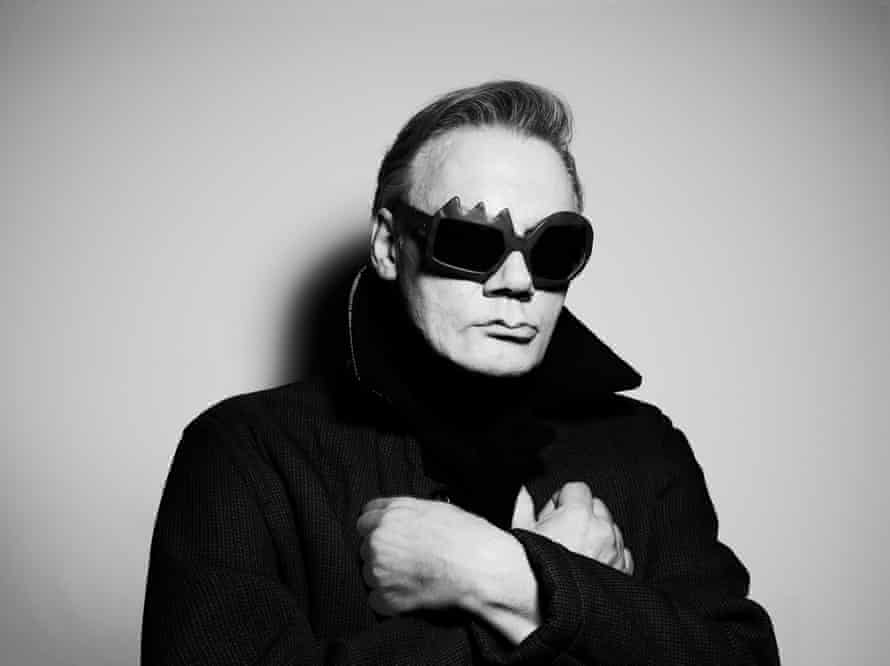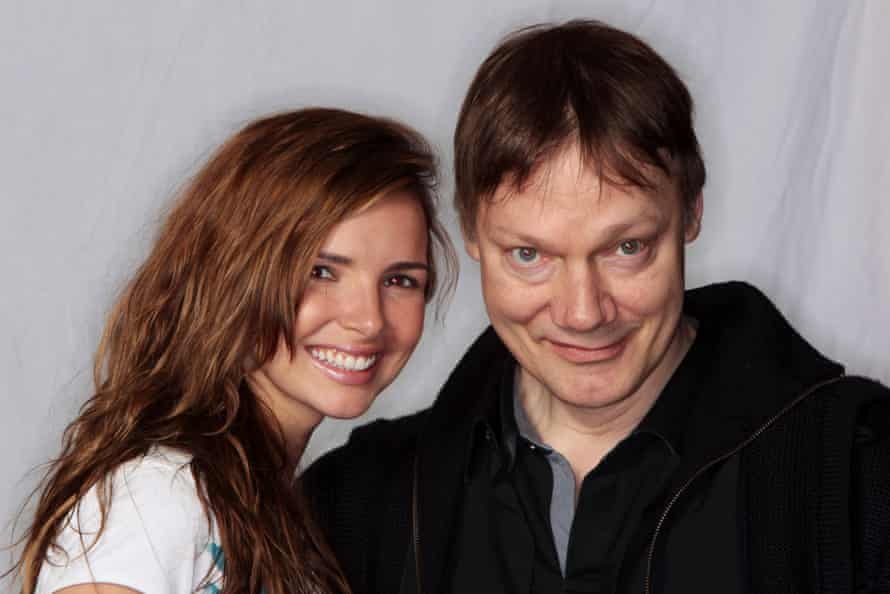There was a point in the early 00s when William Orbit was poised to go interstellar. He was one of the great pop architects of the Y2K era, the Mark Ronson or Jack Antonoff of his day. He produced Madonna’s Grammy-sweeping Ray of Light, with its magnetic techno-lite, in 1998; Blur’s 13 a year later; and made hits for some of the biggest films around the new millennium: Austin Powers: The Spy Who Shagged Me, Charlie’s Angels: Full Throttle, The Next Best Thing and The Beach.
The latter’s lead track, Pure Shores, recorded by the British pop group All Saints, was the second most successful UK single of 2000. Echoes of its breathy acoustica and bleepy-bloopy electronica can still be heard in the charts; it was recently championed by Lorde, who said the song was an inspiration for this year’s much anticipated album Solar Power.
Occasionally, Orbit, 65, will be in his local branch of Whole Foods in Kensington, west London, and Pure Shores will waft over the speakers. These days, he will think: “Oh yeah, it’s all right this track, I get it now.” At the time, it had taken so long to make that he thought it was “pure shite. When you really slave over something, it takes years until you can really listen to it with pleasure. That or a couple of bottles of wine,” he hoots.
In the 80s, Orbit had been in the synth-pop band Torch Song and started Guerilla Studios, working with some of the edgiest acts of the decade – Gary Numan, Cabaret Voltaire and Laibach among them. The following decade, he made house music as Bassomatic. But by 2000, as chillout boomed in popularity, you couldn’t move for Orbit’s ambient-pop twinkliness. Indulging his other great love, orchestral music, Orbit’s classical-electronic fusion album Pieces in a Modern Style went to No 2 in 2000, off the back of a successful remix of Samuel Barber’s Adagio for Strings by the Dutch trance DJ Ferry Corsten.
Orbit was so successful that, between 2002 and 2005, he took up residence at the Leonard hotel near Hyde Park, where he recorded Bono’s vocals for U2’s song Electrical Storm. “I had some serious money and I bought a big fat house in Connaught Square and did it up – and I couldn’t bear to move in,” he says. “So the hotel that I particularly liked, I just moved in there. It was like: this is the life. This is like the Chelsea hotel [in New York], but in London.”
He could have been a superproducer turned star, the UK’s Rick Rubin by way of Moby. But that didn’t quite happen. “It should have,” he nods sagely, long grey hair falling around his face.
When we speak, Orbit is in another hotel room, in an upmarket health resort in Austria, where he has gone to “get toned up a bit”. He has pushed his body to the limit to finish his new album, his first since 2014. It is a triumphant full stop after a tough period, about which he is surprisingly candid. “I did my rock’n’roll excess thing about four years ago, when I was 61,” he says. “I waited that long. I went a bit over the top, learned my lesson. I did go a bit crazy. Drugs will do that to you., you know, if you’ve got a certain predisposition to being in the clouds, as I suppose I do …”
Today, Orbit seems more down to earth. He is terrifically gossipy, in a foppish, conspiratorial way, firing off stories about working with Pink (“one of the grumpiest singers, but one of the best”), hanging out with billionaires (“they’ll be like: is your dog helicopter trained?”) and why he is considering buying a Gandalf staff (“my limbs don’t work because they’re shit”).
He talks at length about Madonna, with whom he made three albums – her unique musicality, her toughness, how she is a better arranger than him – and about whom illuminating anecdotes tumble out of nowhere. “We were at the Hit Factory [studio in New York] once and I walked in on her on the lav – she hadn’t locked it,” says Orbit. “She’s doing a No 2 and I’m like: ‘Oh God, I’m so sorry.’ She said: ‘William, look, I was brought up in a family of six kids with one loo, so don’t sweat it.’”
The first time they worked together, on Ray of Light, “killed me”, says Orbit. “I was in a crisis with my family, which I put on hold. I remember getting very ill that winter; at the age of 43, I was done in physically.” It took months to complete. Madonna, who was a new mum at the time, cracked the whip. As hard as it was, it was an atmosphere in which he thrived. “I flourish under that,” he says. “She’s a fabulous producer. When it says ‘produced by Madonna and William Orbit’, people don’t always give her the credit for that. But she’s as responsible as me.”
After his initial string of successes, however, Orbit became a chart-pop shill for Ricky Martin, Mel C and Chris Brown (and those are just the songs that were released). “I got into this songwriting scene in America and I thought: ‘I’m not suited to this,’” he says. “The inner voice was saying: ‘You did Ray of Light, why are you doing remixes now? You should be the don.’ I didn’t listen. My inner voice got suffocated by my own misguidedness and I felt increasingly impotent to do anything about it.”
He made a couple of his own albums, “but they really fell off. I didn’t get returns to my calls. It’s been yonks since I’ve made any proper statement of my own, rather than trying to do a song for some pop artist who’s got 10 other people on speed dial.”

In the end, he got “more and more frustrated, believing that I was useless and washed up”. The last album he worked on with Madonna, 2012’s EDM-fuelled MDNA, was a commercial and critical failure. “It was disappointing,” says Orbit, adding that he thinks ageism had “a profound negative effect” on its reception.
Britney Spears’s 2013 album Britney Jean arrived shortly afterwards. Executive-produced by will.i.am, the album received lukewarm reviews, little to no promotion and felt strangely impersonal, despite claiming to be the opposite. Orbit worked on its opening track, Alien, in which she compares herself to a lonely extraterrestrial. In light of what we now know about her conservatorship, did the album feel similarly controlled?
“That end of the pop spectrum is more controlled, if you like,” says Orbit, who says that they made Alien remotely. “Here’s the difficult thing, because I’m friendly with Will and with Britney. All I’ll say is that there was a frisson there. If I work with an artist, they are the goddess, they are the boss. If I want to be the boss, I’ll make my own records. You’re here to be in the service of a true pop star – if you don’t have that attitude, you shouldn’t be in the game.”
Eventually, Orbit took a turn for the worse. Four years ago, he moved back to England from Los Angeles and got in with a party crowd. He took up painting, but mainly cocaine. “Instead of worrying about my career, I could just be a hedonist,” he says. “I’d never done coke before and in a short space of time I’d be the guy that could do the most. And then I went to some festivals and I did LSD, mushrooms, MDMA, coke, some hormones that everybody was experimenting with. Codeine. I wasn’t aware of what I was doing and I ended up having a psychotic episode.”
Even that wasn’t enough to stop him. “I cringe when I think about it. I was in a bad space, but not terminally so. Then it got to the point where I started smoking tons of weed – eight joints a day. It never agreed with me and I became manic.”
As a result, last March, “I had a second breakdown”, he says. He was lying in the street, convinced he was a secret operative tasked with saving the royal family. He was sectioned. “Fortunately, once the drugs were out of my system, I finally got back to being normal – and out I was,” he says, with a what-a-wally tone.

Almost as soon as he was released from psychiatric hospital, though, the first UK lockdown was announced. “I was deeply disappointed with myself and there was fucking Covid at the same time,” he says. His new manager put Orbit in touch with a rising alt-pop singer called Maeve and Orbit taught himself how to use Pro Tools on his laptop, via online tutorials, to produce some tracks. He hadn’t made any music for ages “and, bit by bit, I started to enjoy it”. Now, a new Orbit album is almost finished: “The best thing I’ve done in 20 years!” he enthuses. “You’ve caught me at a turning point. You can have a turning point at any age and this is mine.”
But first there is an EP, out next month, for the electronic label Anjunadeep. It feels like what he should have made after Pieces in a Modern Style: symphonic trance crescendos, some chillout meanderings, a major ambient-rave tune. The Canadian-Colombian artist Lido Pimienta appears on vocals, hinting at the direction that his full album might take next year (guest singers aplenty).
He is not worried about being an old man in a young gun’s world; he is energised to see that his sound is having a moment once more. “Ambient music has gone mainstream,” he says. “Radio 1 have got into chill – I’m doing a Wind Down mix for them. Somebody sent me a link to one of my tracks [in a video] on Instagram and it said: ‘Music for calming dogs on Bonfire Night.’”
He is genuinely thrilled, fizzing with enthusiasm. “I realised that I had to grow up a bit,” he says. “I’ve just left my adolescence. It’s great being 65 – it’s easier than being 40, because you’re an old dude and you don’t have an agenda any more. It’s a young game, the pop music game. But I think there’s room for one Bill Nighy. It’s not like it’s a crowded field.”
Perhaps not an agenda, but he does have hopes for his music, at least. “I want this very much – and to reinvent is very hard,” says Orbit. “When you’re young, you don’t realise this at the time, but everything is handed to you. I like a challenge. I desperately want this music to be heard. Nothing will stop me now.”
William Orbit’s Starbeam EP is released on 1 December on Anjunadeep
Stay connected with us on social media platform for instant update click here to join our Twitter, & Facebook
We are now on Telegram. Click here to join our channel (@TechiUpdate) and stay updated with the latest Technology headlines.
For all the latest Music News Click Here
